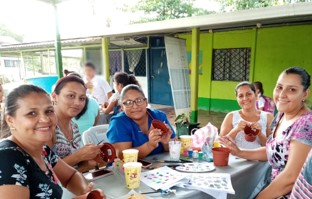Release date: 2020-10-21
Under the motto "In Matina, we inform and transform," the Infants and Environmental Health (ISA) program executed a total of 148 workshops in the first semester of 2019, targeting a participant population of 2,757 students aged between 6 and 8.5 years old, along with 387 parents.
The workshops were conducted based on participatory methodology with the aim of raising awareness among children, mothers, and fathers in Matina about the risks of pesticide exposure. Playful activities, games, and the exchange of knowledge through horizontal dialogues were the cornerstone of the communicative intervention strategy for this population.

One of the main achievements of the participatory workshops was to gain a better understanding of the context of this rural population, which has been studied by the ISA birth cohort for the past 10 years.
The report systematizes information from 37 communities. Regarding the adult population, information is presented based on their experiences with the use and handling of pesticides, perceptions of the expansion of the agricultural frontier, aerial spraying, and environmental reporting constraints, among other social aspects related to interests and needs in entrepreneurship, financial income management, organic farming techniques, strategies for educational support of children, risks in the use of psychotropic substances, dietary habits, physical activity, and water pollution.

This pedagogical experience of "I speak, but I also listen" is one of the most valuable features of the meetings, allowing ISA to develop action research with ecosystemic approaches that promote mitigation actions against potential health effects.
This work was made possible thanks to the support of the Center for Research and Teaching in Education (CIDE), for the study of the workshop proposal carried out by educator Reichel Rodríguez Miranda, Monika Springer (academic from the School of Biology at UCR), the Bioindicators Water Quality Guidelines BMWP-CR, and the Ecotoxicology Laboratory of IRET, for the laboratory equipment provided for the workshops.
Click here to read the full report. .
Written by: Luis Diego Palomo Cordero (
Edited on (2020-10-21): Luis Diego Palomo Cordero (


